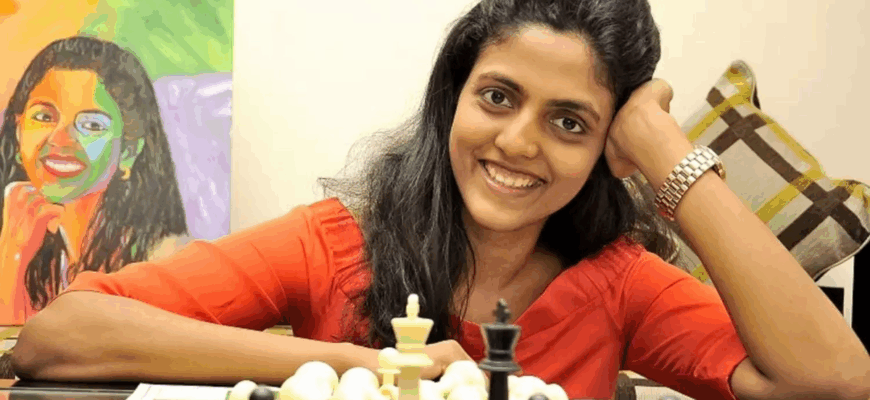In the intricate world of professional chess, where quiet concentration reigns supreme, Grandmaster Harika Dronavalli is rewriting the rules, demonstrating that the most profound strategies extend far beyond the chessboard – into the realm of family and fierce dedication.
Chennai, India, a city renowned for its vibrant culture and intellectual pursuits, once again hosts the prestigious Chennai Grand Masters tournament. Among the seasoned players and rising stars, one narrative stands out with particular poignancy: that of Indian Grandmaster Harika Dronavalli. A formidable force on the 64 squares for over two decades, Harika now brings a unique, delightful, and occasionally chaotic element to the competitive atmosphere: her two-year-old daughter, Hanvika.
Just three years prior, in a display of extraordinary resilience, Harika made headlines at the 2022 FIDE Olympiad, competing successfully while heavily pregnant and contributing to India`s historic bronze medal. It was a testament to her unwavering commitment to the sport. Fast forward to 2025, and while she might not be the headline act in the same dramatic fashion, her presence at the Chennai Grand Masters is arguably more significant, symbolizing a new chapter in the life of a professional athlete.
A Mother`s Gambit: Sharing the Chess World
For Harika, this tournament is not just about rankings or prize money; it`s about sharing her life’s passion with her child for the very first time. “I made her sit on the board, move the pieces. That felt good,” Harika shares, reflecting on a moment many parents in demanding professions can appreciate. After 25 years immersed in the international chess arena, the sight of Hanvika observing her mother`s world, even in its quiet intensity, is a profound reward. It’s a subtle yet powerful statement: that a professional career, even one as demanding as grandmaster-level chess, doesn`t have to exist in isolation from family life.
The decision to bring Hanvika to Chennai was a deliberate one, a “new strategy” if you will, in Harika`s ongoing game of balancing career and motherhood. While the logistical challenges of travel, adjusting to new environments, and managing a toddler’s needs are far from trivial – as any parent will attest – the emotional payoff is immense. The ever-present “mom guilt” of leaving a child behind is, for now, replaced by the joy of shared experience. Chennai`s proximity to her home in Hyderabad made it the ideal testing ground for this novel approach.
“I`m happy she could witness my life in a way. These chances only come because we`re playing such a strong tournament in our country.”
Of course, a chess tournament with a toddler isn`t without its dramatic moments. A minor scare involving a hotel fire before the event began briefly heightened Harika`s concerns for Hanvika`s safety. Thankfully, quick action from the organizers, MGD1, swiftly alleviated any fears, underscoring the critical role of support systems in enabling athlete-parents to compete.
Beyond the Scoreboard: Fun and Perspective
Despite losing her initial two games in the Challengers section against strong young Grandmasters, Harika’s perspective remains refreshingly grounded. Her primary goal isn`t just about winning every game, but about enjoying the process, testing herself against a robust field, and simply “having fun.” This mindset, perhaps honed by the broader responsibilities of motherhood, injects a valuable dose of humanity into the fiercely competitive landscape of professional chess.
The current era is a golden one for Indian women`s chess, with talents like Divya Deshmukh and Koneru Humpy making significant strides, including qualifying for the Women`s Candidates. Harika is quick to praise these achievements, but reserves a special admiration for Koneru Humpy, acknowledging the immense challenges Humpy faces as a mother competing at the highest level. “With having a kid, family, so many responsibilities, the way she fought was just amazing,” Harika notes, highlighting a kinship and understanding that only fellow athlete-mothers can truly grasp.
A New Dawn for Chess and Motherhood
Harika Dronavalli`s journey, punctuated by a bronze medal during pregnancy and now by the playful presence of her daughter, embodies a larger shift. It`s a testament to the evolving recognition of women in sports, and a quiet revolution in how professional athletes integrate their personal and professional lives. For years, Harika believed in the sport`s potential, even when her own significant achievements often went unrecognized. She now finds immense satisfaction in witnessing chess gain the spotlight it deserves, and to be an active part of this transformation, rather than observing it from retirement.
Her story isn`t just about a chess player; it`s about the broader narrative of resilience, the beautiful intricacies of family, and the quiet triumph of balancing grand ambitions with the most personal of joys. In Chennai, Harika Dronavalli isn`t just playing chess; she`s demonstrating a winning strategy for life itself.







